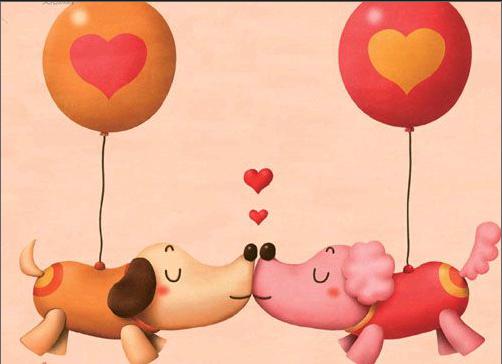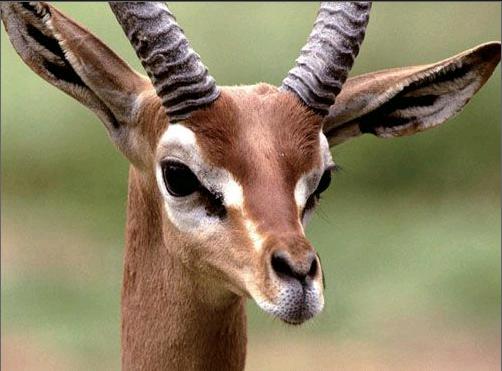Languages of Love: 10 Unusual Terms of Endearment 蜜语甜言:异乎寻常的10种爱称
2014-02-27


Some terms of endearment can be used in many languages—“baby,” “angel” and “sweetheart” for example. But some dont travel as well as you might think. If you call a French person “honey” (miel) he or she may take it as an unflattering comparison with a sticky mess.
And how would you react if someone called you a cauliflower1), a flea or a baby elephant? Here is a quick guide to the language of love around the world—dominated by metaphors from cookery and the animal kingdom—with contributions by language coach Paul Noble.
Little Cabbage (French)
Petit chou
“Chou” (cabbage) is the French equivalent of “sweetheart.” “Chou” conveys the idea of being small and round and is used to describe French puff pastry2), often enjoyed as “chou à la crème.” “Chou” is said to resemble a babys or childs head too. Over the years, many French children have been told that boys were born in cabbages and girls in roses. You can double it too—“chouchou” is a standard translation for “darling.”
Pumpkin (Brazil/Portuguese)
Chuchuzinho
“Chuchu” is the word for “squash3)”—but strangely similar to the French “chouchou.” Could a French word have sneaked into Portuguese as a fancy way to refer to a loved one (even though it refers to a different vegetable)? The ending “zinho,” meaning “little,” emphasises fondness.
An Egg-shaped Face (Japanese)
Tamago gata no kao
In Japan, women are frequently called “an egg-shaped face” by those who love them. This is a great compliment, as having an oval, egg-shaped face is considered very attractive in Japanese culture—you can see this in Japanese paintings through the ages.
Lump of Sugar (Spanish)
Terrón de azúcar
Like “honey” in English, sweet foodstuffs of one kind or another make popular terms of endearment in numerous languages. This popular one in Spanish, “terrón de azúcar” also means “sugar cube.” Apparently, it rates highly on the “sweetness” scale, so use sparingly.
Fruit of My Heart (Indonesian)
Buah hatiku
Although the term can be used romantically, featuring in love songs and poems, today it is most often used to express affection for children. Advertisers use the term to appeal to family-oriented customers, especially young middle-class couples: “The best gift/food/product for ‘the fruit of your heart.” You will also find the term in almost all books and articles on parenting, and it frequently appears as the name of organisations focusing on children, including a hospital near Jakarta.
My Flea (French)
Ma puce
“Ma puce” is roughly equivalent to “sweetie” in English. One theory suggests that it could be linked to the historic relationship shared by humans and fleas—in times past, removing fleas from one another became a one-to-one grooming4) activity, and is alleged to have been a pleasant and sometimes intimate process.
Gazelle5) (Arabic)
Ghazal
Classical Arabic poetry abounds with the imagery of beautiful gazelles (i.e. women, metaphorically speaking). There are numerous references to the “lethal spears” of a beautiful womans gaze. If you believe the poets, hunters (i.e. men) can die of love-sickness after a single glance from a gazelle. Today too, a man may say to a woman, “You have the eyes of a gazelle.” (“Laki uyounul ghazal”) This may imply that he has fallen under her spell sooner than she has his.
Little Elephant (Thai)
Chang noi
Elephants are the dearest of animals to Thai people. They are supposed to bring good luck, white elephants especially. The elephant symbol might derive from the Hindu god Ganesh6), reflecting the great influence that Indian culture exerted across this region. Elephants so captured the nations heart that they once became an emblem7) on the countrys flag. “Little elephant” can be used affectionately by an adult to a child—used between adults it would have a different connotation.
Diving Fish, Swooping8) Geese (Chinese)
Chen yu luo yan
There is a story surrounding the greatest beauty in Chinese history, a woman named Xi Shi. Its said that she was so beautiful that when she looked at fish in a pond, the fish were so dazzled by her beauty that they forgot to swim and gradually dived to the bottom. Likewise, when geese flew over a woman called Wang Zhaojun, they were so struck by her beauty that they forgot to flap their wings and ended up swooping to the ground. Because of this, to this day, when a young Chinese man is in love with a Chinese woman, he may indicate that, to him, she is as beautiful as Xi Shi or Wang Zhaojun. To do this, he will say just four words: “Diving fish, swooping geese.”
Little Dove (Russian)
Golubchik (masc)/golubushka (fem)
Pushkin used the word “little dove” to refer affectionately to his elderly nanny in the lines of one of his best-known poems, but she could equally have used it to refer to him when he was a child (and probably did). As a term of endearment it dates back at least to the Song of Songs in the Old Testament (“O my dove ... let me see thy countenance”), originally written in Hebrew. The Slavonic translation of the Bible had a profound influence on shaping the Russian language, so the Russian usage could have Biblical roots.
有些爱称在很多种语言中都能使用,例如“宝贝”“天使”和“甜心”,但有些并不像你想象的那样通用。如果你称一个法国人为“蜂蜜”(miel),他或她也许会觉得这是拿一团黏糊糊的东西打了一个不太恭敬的比方。
如果有人称呼你为“花椰菜”“跳蚤”或是“象宝宝”,你会做出怎样的反应?本文是世界各地的爱称——主要是来自烹饪领域和动物世界的暗喻——的快速指南。语言教师保罗·诺布尔参与了本文的撰写。
小甘蓝(法语)
法语中的“chou”(甘蓝)相当于“甜心”。“Chou”让人联想到小巧、圆鼓鼓的样子,被用来描述法国酥饼。法国酥饼通常被做成“chou à la crème”(泡芙)享用。据说“chou”还很像婴儿或儿童的头。多年来,很多法国孩子都听过这样的说法:男孩是从甘蓝中出生的,女孩是从玫瑰中出生的。你还可以将其用作叠词——“chouchou”是“亲爱的”这个词的标准法语译法。
南瓜(巴西/葡萄牙语)
“Chuchu”是与“南瓜属植物”相对应的一个词,但奇怪的是它与法语单词“chouchou”很相似。难道一个法语单词溜进了葡萄牙语,成为用来称呼爱人的一种奇特方式(尽管它指的是另一种蔬菜)?词尾的“zinho”意为“小的”,强调了宠爱之意。
鸡蛋形的脸(日语)
在日本,女性常常被爱她们的人称为“鸡蛋形的脸”。这是一种评价很高的赞美,因为在日本文化中,拥有鸡蛋般的椭圆脸型被认为是非常迷人的。你可以从历代的日本绘画中发现这一点。
方糖(西班牙语)
就像英语中的“蜂蜜”一样,在很多语言中,这样或那样的甜食会成为常用的爱称。西班牙语中这个常用的爱称“terrón de azúcar”就是“方糖”的意思。显然,这个词在“甜蜜”等级上排名很高,所以要省着点用。
我心中之果(印度尼西亚语)
尽管这个词可以用来表达浪漫之意,出现在爱情歌曲和诗歌中,但如今这个词最常用来表达对儿童的爱。广告商用这个词来吸引重视家庭的顾客,特别是年轻的中产阶级夫妇:“给‘你心中之果的最佳礼物/食品/产品。”你还可以在几乎所有关于育儿的图书和文章中发现这个词。某些关于儿童的组织也经常以这个词来命名,包括雅加达附近的一家医院。
我的跳蚤(法语)
“Ma puce”大致相当于英语中的“亲爱的”。一种分析认为,这可能与人类和跳蚤的历史关系有关——很久以前,相互捉跳蚤的行为成为一种一对一的梳理活动,并且据说已经成为一种愉快且有时很亲昵的过程。
瞪羚(阿拉伯语)
经典阿拉伯诗歌中有大量美丽的瞪羚的形象(即女性的隐喻)。很多诗歌将美女的注视称为“致命的矛”。如果你相信诗人的诗句,那么猎人(即男性)在被一只瞪羚瞥一眼之后可能就会因相思而死去。如今,一位男士也会对一位女士说:“你长着一双瞪羚的眼睛。”这可能暗示这位男士已经在这位女士被他迷倒之前而被她迷倒了。
象宝宝(泰语)
象是泰国人最喜爱的动物。人们认为象可以带来好运,特别是白象。象的象征意义可能源自印度神灵加内什,这反映了印度文化对这个地区的重要影响。象令这个国家如此倾心,一度成为泰国国旗上的一个符号。成年人可以把“象宝宝”作为对儿童的爱称;用于成人之间时,这个词就有了不同的含义。
沉鱼落雁(汉语)
关于中国历史上最美丽的女子——西施,有这样一个故事。据说她是如此美丽,当她注视池塘中的鱼儿时,鱼儿为她的美丽而倾倒,以至于忘记游动,逐渐沉入了水底。类似地,当大雁从一个名为王昭君的女子头顶飞过时,它们为其美艳而震惊,竟然忘记振翅飞翔,最后坠落到地上。正因为如此,时至今日,当一位中国小伙爱上一位中国姑娘时,他可能会暗示:对于他而言,她就像西施或王昭君一样美丽。为了表达此意,他只说四个字就行了:“沉鱼落雁。”
小鸽子(俄语)
在普希金非常著名的一首诗歌中,他把“小鸽子”这个词作为对其老保姆的爱称,但她同样也可以在普希金还是个孩子的时候用这个词来称呼他(可能就是这么称呼的)。这个词作为爱称的用法至少可以追溯到《旧约圣经》中的《雅歌》(“我的鸽子啊……求你容我得见你的面貌”)。《旧约圣经》最早是用希伯来语写成的。《圣经》的斯拉夫语译本对俄语的形成产生了深远的影响,因此俄语中的这个用法可能源自《圣经》。
1. cauliflower [?k?li?fla??(r)] n. [植]花椰菜
2. puff pastry:千层饼,酥饼
3. squash [skw??] n. 南瓜属植物
4. groom [ɡru?m] vt. 梳毛;使整洁
5. gazelle [ɡ??zel] n. [动]瞪羚(产于非洲和亚洲的一种小羚羊)
6. Ganesh:加内什,长有象首的印度预言神
7. emblem [?embl?m] n. 符号;纹章(图案)
8. swoop [swu?p] vi. (突然)下落,下降
